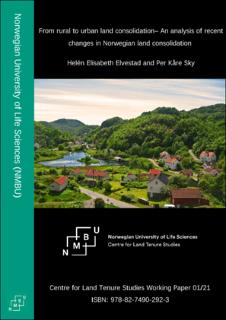Land, as a factor of production, has a vital role within the agricultural sector compared with other sectors. However, in recent years, land mobility has become a significant issue around the world with increased concentration and competition for land ownership, limiting the overall…
Suitable land is an important prerequisite for crop cultivation and, given the prospect of climate change, it is essential to assess such suitability to minimize crop production risks and to ensure food security. Although a variety of methods to assess the suitability are available, a…
Land use change plays a key role in terrestrial systems and drives the process of ecological pattern change. It is important to investigate the process of land use change, predict land use patterns, and reveal the characteristics of land use dynamics. In this study, we adopted the Markov model…
The land topic has generally become a major socioeconomic issue that currently attracts attention globally. To explore the issue, various countries devote much attention to land use planning. This paper searches the Core Collection of the Web of Science and collects 1771 land use planning…
Informal settlements represent a challenging operational context for local government service providers due to precarious contextual conditions. Location choice and land procurement for public infrastructure raise the complicated question: who has the right to occupy, control, and use a piece of…
Over the past several decades, land investments have dramatically increased to meet global food and biofuel demands, produce industrial commodities, protect environments and develop urban centres. Scholars and media actors have labelled this phenomenon “land grabbing”, owing to its many negative…
In most countries, land consolidation was first introduced in rural areas, with legislation suitable for urban areas being drafted at a later date. This is also true of Norway. The first evidence of urban competency in the legislation is found in the Land Consolidation Act from 1950. It is…
Land degradation has become one of the major global environmental problems threatening human well-being. Whether degraded land can be restored has a profound effect on the achievement of the 2030 UN Sustainable Development Goals. Therefore, the ways by which to identify the current research…
Peer review is the driving force of journal development, and reviewers are gatekeepers who ensure that Land maintains its standards for the high quality of its published papers [...]
It is crucial to pay close attention to the ecological security in land consolidation and utilization of coastal tidal areas and make an appropriate zoning scheme to meet the characteristics of its particular landscape. Landscape security patterns can identify the patterns that are crucial to…
Regional ecological security assessment is a significant methodology for environmental protection, land utilisation, and human development. This study aims to reveal the regional constraints of ecological resources to overcome the difficulties and complexities in quantification of current models…
In agriculture, land use and land classification address questions such as “where”, “why” and “when” a particular crop is grown within a particular agroecology. To date, there are several land suitability analysis (LSA) methods, but there is no consensus on the best method for crop suitability…



